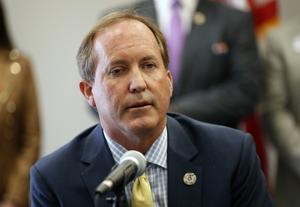 This file photo taken on Oct 1, 2019 shows the logos of mobile apps Facebook and Google displayed on a tablet in Lille. (DENIS CHARLET / AFP)
This file photo taken on Oct 1, 2019 shows the logos of mobile apps Facebook and Google displayed on a tablet in Lille. (DENIS CHARLET / AFP)
WASHINGTON - Texas and nine other states sued Google on Wednesday, accusing it of working with Facebook Inc in an unlawful manner that violated antitrust law to boost its already-dominant online advertising business.
The states asked that the Alphabet Inc-owned company, which controls a third of the global online advertising industry, compensate them for damages and sought “structural relief,” which is usually interpreted as forcing a company to divest some of its assets.
The states asked that the Alphabet Inc-owned company, which controls a third of the global online advertising industry, compensate them for damages and sought “structural relief,” which is usually interpreted as forcing a company to divest some of its assets
The Texas lawsuit is the second major complaint from regulators against Google and the fourth in a series of federal and state lawsuits aimed at reining in alleged bad behavior by Big Tech platforms that have grown significantly in the past two decades.
Google called the Texas lawsuit “meritless.” Facebook did not immediately respond to a request for comment.
ALSO READ: Google’s Gmail service suffers outage for two days in a row
Wednesday’s action raises the legal stakes for Google, which is expected to face a third antitrust lawsuit from more than 30 attorneys general on Thursday, according to a source familiar with the matter.
Online publishers including Genius Media Group and news website The Nation alleged on Wednesday in a separate antitrust lawsuit, which seeks class action status, that they lost revenue because of Google’s dominance in online ads. They demand Google divest part of its ads business.
In its lawsuit, Texas asks a judge to find Google guilty of breaking antitrust law and to order the violations to stop. It accuses Google of abusing its monopoly over the digital ads market, allowing its own exchange to win ad auctions even when others bid higher and overcharging publishers for ads.
It also accused Google of working with Facebook. The two companies compete heavily in internet ad sales and together capture over half of the market globally.
“As internal Google documents reveal, Google sought to kill competition and has done so through an array of exclusionary tactics, including an unlawful agreement with Facebook, its largest potential competitive threat,” the lawsuit reads.
ALSO READ: France fines Google 100m euros for breaching cookies rules
The two players agreed in a publicized deal in 2018 to start giving Facebook’s advertiser clients the option to place ads within Google’s network of publishing partners, the complaint alleged. Executives at the highest level of the companies signed off on the deal, according to the complaint.
For example, a sneaker blog that uses software from Google to sell ads could end up generating revenue from a footwear retailer that bought ads on Facebook.
 In this Sept 10, 2020, file photo, Texas Attorney General Ken Paxton speaks at the Austin Police Association in Austin, Texas. Paxton on Wednesday, Dec 16, 2020, announced a multi-state lawsuit against Google, accusing the search giant of “anti-competitive conduct" in the online advertising industry. (JAY JANNER / AUSTIN AMERICAN-STATESMAN VIA AP)
In this Sept 10, 2020, file photo, Texas Attorney General Ken Paxton speaks at the Austin Police Association in Austin, Texas. Paxton on Wednesday, Dec 16, 2020, announced a multi-state lawsuit against Google, accusing the search giant of “anti-competitive conduct" in the online advertising industry. (JAY JANNER / AUSTIN AMERICAN-STATESMAN VIA AP)
Google reached similar partnerships with other advertising companies as part of an effort to maintain market share that was internally codenamed Project Jedi, a source with direct knowledge of the matter said.
But what Google did not announce publicly is that it gave Facebook preferential treatment, the complaint alleged. Facebook agreed to back down from supporting competing software, which publishers had developed to dent Google’s market power, according to the complaint.
“Facebook decided to dangle the threat of competition in Google’s face and then cut a deal to manipulate the auction,” said the states, citing internal communications.
ALSO READ: Google accused of abusing power in landmark antitrust case
In exchange, the states said, Facebook received various benefits, including access to Google data and policy exceptions that enabled its clients to unfairly get more ads placed than clients of other Google partners could.
Google spokesman Peter Schottenfels described the states’ accusations about the ongoing partnership as inaccurate and said that Facebook does not receive special data. Facebook did not respond to requests for comment.
The complaint also alleged that Google and Facebook engaged in fixing prices of ads and have continued to cooperate, though the section was heavily redacted and left it unclear just how and when the companies allegedly used their “market allocation agreement.”
However, the states said that “given the scope and extensive nature of cooperation between the two companies, Google and Facebook were highly aware that their agreement could trigger antitrust violations. The two companies discussed, negotiated, and memorialized how they would cooperate with one another.”
The states did not accuse Facebook of wrongdoing in the complaint.
ALSO READ: How Big Tech companies gain and maintain dominance
The lawsuit, filed in the Eastern District of Texas, also hews closely to concerns publicly raised by Rupert Murdoch-owned News Corp and other media companies to regulators in the United States and Europe over the last two years. It said Google lowered its fees to near zero to gain dominance among publishers, used deceptive tricks to broker transactions between publishers and advertisers, and extracted high fees from both parties for playing referee.
Free Market
In a video posted on Twitter, Texas Attorney General Ken Paxton said, “If the free market were a baseball game, Google positioned itself as the pitcher, the batter and the umpire.”
Paxton, who faces allegations he abused the power of his office and committed bribery, also recently contested the results of Nov 3’s US presidential election in several battleground states. The Supreme Court rejected that suit.
Paxton, along with 10 other state attorneys general, also joined a US Justice Department’s lawsuit against the company in October that accused the US$1 trillion California-based company of illegally using its market power to hobble rivals.
The nine states that joined Texas on Wednesday are Arkansas, Indiana, Kentucky, Missouri, Mississippi, South Dakota, North Dakota, Utah and Idaho. All have Republican prosecutors.
Google ad sales account for over 80 percent of Alphabet’s revenue. But most of the sales and the bulk of Alphabet’s profits come from Google’s high-margin operation of placing text ads above search results.
READ MORE: Big Tech's market abuses: US lawmakers press for strict reform
The business targeted on Wednesday - placing ads on partner apps and websites - matters far less to Google.
Alphabet reported quarterly digital advertising revenue of US$37.1 billion in its latest financial report. Alphabet shares ended 0.2 percent lower at US$1,757.19 on Wednesday. Facebook shares, which briefly turned negative after details of the Texas lawsuit were published, reversed losses and ended little changed.


